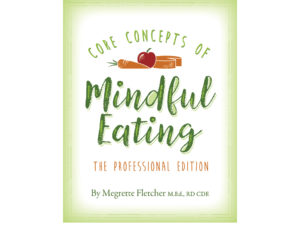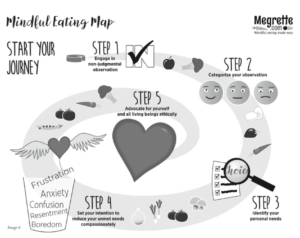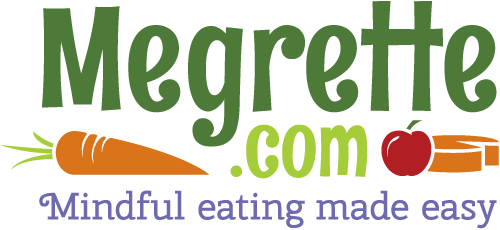Dietitians are excited about bringing Mindful Eating into their nutrition counseling session because research shows that it helps decrease portions, food cravings, emotional eating, binge-eating behavior, depression and anxiety, emotional stress, and automatic or habitual behavioral response to food. It also improves food selection, body image, and stress management, while increasing a sense of autonomy and control surrounding food and eating choices. However, the greatest benefit of Mindful Eating — that it does not cause harm, like many popular diet and eating plans — is woefully underreported. In fact, the evidence shows that Mindful Eating heals the psychological, emotional, or physical harm caused by restrictive eating, which is thrilling to consider.
 Seeing the “Big Picture” of Mindful Eating is helpful for dietitians because any practice that offers this much evidence-based benefit is more encompassing than chewing slowly or turning off the television. Many dietitians have not had a chance to reflect on how Mindful Eating changes the relationship a person has with food and eating. This is because experts in the field of Mindful Eating are focused on helping you master the tools and techniques they developed. They are not offering a review, exploration, or comparison of the options available to dietitians. This is why I decided to write The Core Concepts of Mindful Eating: Professional Edition. This is the only book available for professionals that lays out the “Big Picture” of Mindful Eating.
Seeing the “Big Picture” of Mindful Eating is helpful for dietitians because any practice that offers this much evidence-based benefit is more encompassing than chewing slowly or turning off the television. Many dietitians have not had a chance to reflect on how Mindful Eating changes the relationship a person has with food and eating. This is because experts in the field of Mindful Eating are focused on helping you master the tools and techniques they developed. They are not offering a review, exploration, or comparison of the options available to dietitians. This is why I decided to write The Core Concepts of Mindful Eating: Professional Edition. This is the only book available for professionals that lays out the “Big Picture” of Mindful Eating.
Start by Asking Two Questions
Let’s begin by pausing and becoming aware that there are two questions that need to be asked to see the Big Picture of Mindful Eating. The first is, “What do I teach?” This is looking at the pedagogy of Mindful Eating. As a dietitian, ask: “Do I understand the basic steps of Mindful Eating? Can I outline the process of teaching Mindful Eating?” The second question is “How do I teach?” This is looking at the didactic aspects of Mindful Eating with an eye toward advancing your teaching and counseling skills. Let’s explore!
What to Teach? How to Teach?
The Core Concepts of Mindful Eating: Professional Edition presents the Mindful Eating Map. This five-step process provides an overview of Mindful Eating to guide the dietitian and client.
The Mindful Eating Map will help you decide in a counseling session what tool to use and when to use it.
 The next step is shifting the question from “What to teach?” to “How to teach?” Unless you have received additional training, your counseling skills may not be as advanced as your teaching skills. Many dietitians are asking, “How can I deepen and advance my counseling skills without becoming a therapist?” I had to answer this question for myself. I decided I needed to learn Motivational Interviewing, or MI.
The next step is shifting the question from “What to teach?” to “How to teach?” Unless you have received additional training, your counseling skills may not be as advanced as your teaching skills. Many dietitians are asking, “How can I deepen and advance my counseling skills without becoming a therapist?” I had to answer this question for myself. I decided I needed to learn Motivational Interviewing, or MI.
I love MI, which is why in the book The Core Concepts of Mindful Eating: Professional Edition, the technique is woven into the program. The book can serve as an introduction to the concept and give you a taste of this amazing approach. I know that you can’t do it all, and you may be wondering, “Should I learn Mindful Eating or improve my counseling skills?” Evaluate your talents: Are you “excellent” at teaching nutrition, but you get stuck and struggle a bit when the session moves from teaching to a more relationship-based coaching experience? If you see patients for many sessions, MI training will fill in the gaps in your counseling, helping you transition your counseling skills from “good” to “excellent.” Regardless of what you teach, you will always benefit from improving your counseling skills. This is why I recommend taking MI training as a introduction to your Mindful Eating training. If you have heard of MI and are interested in learning more, there are books, online sessions, and in-person 2- or 3-day training. Choosing a teacher who is part of the Motivational Interviewing Network of Trainers, or MINT, is recommended. It is wonderful to see the growing number of dietitians who are part of MINT and teaching MI.
My interest in mindfulness and Mindful Eating became a passion. I have learned so much about eating, myself, and my clients — but my learning isn’t over. Despite my knowledge, my skillfulness can only grow when I practice Mindful Eating. But growth requires repetition, solid counseling skills, support, and continuous learning. Practicing can become stale and unrewarding unless you have an influx of ideas, inspiration, and support to keep learning. The Core Concepts of Mindful Eating: Live Training is an intimate way to energize your learning. This live, small-group, 10-week, interactive program is offered three times a year and provides 40-CPE! You can also find organizations that promote a weight-neutral mindfulness message, such as The Center for Mindful Eating, The Mindful Dietitian Facebook group, Am I Hungry Training, Health At Every Size community, or Intuitive Eating community.

